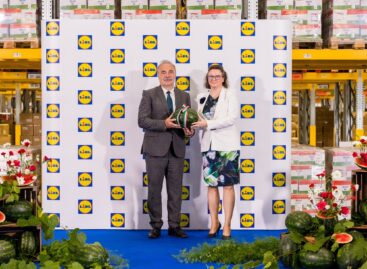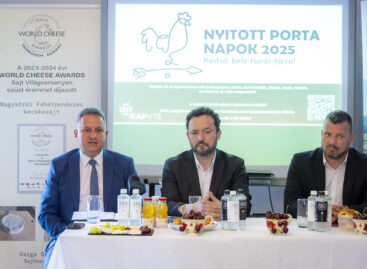Business Dinner 2020: ‘It is unlikely that we will have to step on the brake this hard again’
Trade magazin’s traditional end-of-May Business Dinner was organised online this year. The participants were Dr Zsolt Feldman – state secretary of the Ministry of Agriculture, András Báldi PhD – scientific consultant of the Centre for Ecological Research, Görgy Jaksity – president of Concorde and Dr Ákos Kozák – business partner of Impetus Research. Trade magazin’s managing director and editor-in-chief Zsuzsanna Hermann was the event’s host and the moderator was Szilvia Krizsó.

Hermann
Zsuzsanna
ügyvezető-főszerkesztő
Trade magazin

Krizsó Szilvia
kommunikációs
tanácsadó

Dr. Zsolt Feldman
state secretary
Ministry of Agriculture
Dr Feldman started out by saying that no one had been prepared for the pandemic situation, and in the last two decades people got so used to the supply chain making the products available at all times that now their sense of safety is shaken. Dr Kozák highlighted the fact that retail sales were up 7.2 percent at the end of March 2020 – within this food sales increased by 9.6 percent. Mr Báldi opined: one of the most important lessons the crisis taught us is that agriculture is much more important than the GDP suggests, as our survival depends on the sector. He thinks that the economy has become very much specialised, which guarantees high profits, but the system collapses if there is a problem.
Good measures with limited room for manoeuvre

György Jaksity
president
Concorde
Mr Jaksity explained what differentiates COVID-19 from any other crises before: in the past there has never been an economic recession that occurred because the economic actors had to limit their own operations. Since the new crisis is unlike any other before it, the budgetary and monetary steps taken in the past won’t necessarily work. Mr Jaksity’s view is that in certain segments of the economy the decline is as big as 80-90 percent. As for the steps the Hungarian government took during the pandemic, Concorde’s president thinks the decisions were made at the right time and they were based on the experiences of other countries. As for the economic policy measures, the government realised that swift action was needed, but it had limited space for movement and relatively small sums could be freed from the budget to improve the situation. There aren’t adequate reserves in the system to stimulate the economy. Dr Feldman pointed it out that the Hungarian bank sector is able to carry the burden of the moratorium on the repayment of loans – this approximately HUF 2,000-billion sum represents 4.5 percent of the GDP. He thinks that the Hungarian economy successfully survived the last few months. The government measures created an economic safety net that is available to many Hungarian businesses.
Reserves need to be made

Dr. Ákos Kozák
business partner
Impetus Research
Dr Kozák said a recent TÁRKI survey reveals that 18 percent of respondents have lower income than before the pandemic – 40-59 year old city dwellers are the most affected by this trend; 7 percent lost their job in the month before the survey. In his view it is also important that every seventh respondent had to cope with some kind of problem mentally.

András Báldi
scientific consultant
Centre for Ecological Research
Mr Báldi said there have always been disasters, and according to climate change and biodiversity researchers these are going to occur more frequently than before. Consequently, the state, companies and individuals all need to prepare for these and make reserves. On the other hand, in the last few months the air became 50 percent cleaner in certain places – nature is capable of quick renewal, but humanity must draw the right conclusions from situations like the present one.
Dr Feldman told about the HUF 25 billion financial help for the agri-food sector that the food industry will receive HUF 8 billion, hoping that the level of production can be maintained by quick non-refundable financial support. He added that the Ministry of Agriculture will also announce a HUF 80-billion investment programme, from which HUF 50 billion will be available to those livestock farmers who wish to modernise their production facilities, while HUF 30 billion is earmarked for fruit and vegetable farming, e.g. building cooling facilities and greenhouses, increasing storage capacity, etc. Ms Krizsó informed that the government calculates with a 5-percent economic growth for 2021, while the IMF predicts a 7.5-percent decline and the Bank of England forecasts a 15-percent worsening of the GDP. Mr Jaksity reckons that the level of economic recession is likely to be 5 percent. The economic recession will be smaller if there is no second wave of the pandemic.
Waiting for the economy to bounce back
Dr Kozák shared some very interesting data: in the first quarter of 2020 3,730 fewer people died in Hungary than in the first quarter of 2019. He added that according to a Euromonitor forecast, consumer spending will drop 4.3 percent in 2020. Even if there will be a second wave of the pandemic, the decline won’t be as sharp as during the first wave. Euromonitor thinks there will be a 1.5-0 percent recession or growth, but its effect will vary greatly across sectors, for instance, the food industry can grow by two-digit numbers. Dr Feldman expressed his opinion that with the pandemic protection experience that we already have and hopefully a vaccine in the near future, it is unlikely that we will have to step on the brake this hard again. In his view those small economic actors have ended up in a very difficult position that makes high-quality products, as demand increased for lower-priced products in the last few months. Mr Báldi believes there is a good chance for having a vaccine relatively soon, but the problem is that other global problems (e.g. those caused by climate change) are likely to follow.
Measures that started out as temporary will stay with us
As for the long-term effects of the pandemic, Mr Jaksity said temporary measures introduced during the pandemic will become permanent. The majority of workers will return to their workplace, but many events will remain online-only. Digitalisation is also affected by the pandemic, as warehouses are now in the centre of attention instead of stores, and online shops are in the spotlight, not physical stores. Home office used to be a marginal issue, but now this form of working is frequent. Companies can save on workforce, working time, commuting and office rental thanks to employees working from home. Dr Kozák added that it is the heads of companies who are shaping the future. He predicts that in the long run contractual forms of employment will become much more frequent than they are now. If the pandemic will continue in the third and fourth quarters of 2020, people will spend the majority of their money. Omnichannel retail is likely to become more significant and brands will be valued more in the long term because shoppers trust them more.
Mr Báldi shared the results of his calculations: Hungary should cut its CO2 and CO2 equivalent emission by 75 percent, reduce phosphorus emission to 37 percent and nitrogen emission to 22 percent until 2050. This would mean that the country is using its natural resources in a manner that means no threat for the planet. Dr Feldman called attention to the problem that the European Commission’s proposed budget makes a recommendation for managing the negative effects of the COVID-19 pandemic on the European economy. The problem is: the funding budgets are getting smaller, while a large part of the money should be spent on the structural transformation of the European agri-food sector. However, the financial resources are too small and this will lead to a decrease in productivity – at the same time food produced in the third world and exported to Europe won’t have to meet such strict criteria, e.g. in terms of sustainability. //
Related news
Lidl and the Ministry of Agriculture announced: the domestic melon season has begun
The first shipment of watermelons from Hungarian suppliers has arrived…
Read more >Producers and consumers must be brought closer together
By strengthening the short supply chain, producers and consumers must…
Read more >New call supports sustainable water management communities
The call for applications entitled “Supporting sustainable water management communities…
Read more >Related news
GKI analysis: Why do Hungarian households live more poorly than anyone else in the EU?
Imagine that the residents of every EU country shop in…
Read more >KSH: industrial producer prices decreased by 0.7 percent in May 2025 compared to the previous month, and increased by an average of 6.9 percent compared to a year earlier
In May 2025, industrial producer prices were 6.9 percent higher…
Read more >Consumption drives the economy
According to the latest forecast by the Balance Institute, the…
Read more >






